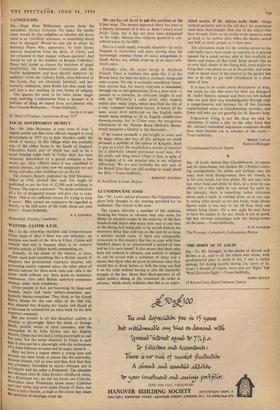WANTED--U1STER A.Y.M.
SIR,--In the otherwise excellent and comprehensive Ulster issue of May 3 there was one omission : no mention was made of the Arts in Ulster. Cynics will remark that this is because there is no creative artistic activity in Ulster worth commenting on.
Actually, in the realm of the theatre, at least, Ulster must hold something like a British record. It supports two professional repertory theatres, one Presenting mainly regional plays, the other plays of general interest for three-week runs and—this is the point—both without any State grant or assistance Whatsoever. Few other British repertory companies manage under such cOnditions.
Ulster people, in fact, are becoming, by leaps and bounds, more and more culture-conscious, par- ticularly theatre-conscious. They flock to the Grand Opera House for the rare visits of the Old Vic, they demand that Waiting for Godot and Death of a Salesman be retained for an extra week by the Arts repertory company. But one feature in all this theatrical activity is Missing—a playwright. Since the death of George Sheils, prolific writer of rural comedies, and the absorption Of St. John Ervine into the English theatre, Ulster has not had a rising playwright to call tier own. Yet the social situation in Ulster is such that it cries out for a playwright with the inclinations of a John Osborne to come and be angry about it. Here we have a region where a young man and woman can meet freely at places like the university, become friends, fall in love and then find that they arc absolutely forbidden to marry—because one is a Catholic and the other a Protestant. The situation has changed since St. John Ervine's childhood, when, as a Protestant boy, he did not know one Catholic. Nowadays most Protestants know many Catholics and vice versa, and even make friends of them, but there is still a barrier, as high as the colour bar, when the question of marriage crops up. No one has yet dared to put this problem on the Ulster stage. The nearest approach there has been to a literary treatment of it was in Anne Crone's novel Bridie Steen, but it has not even been dramatised on the radio, because this religious question is con- sidered taboo by the BBC. '
Here is a ready-made, romantic situation—far more frequent in occurrence and more moving than the increasingly popular theme of racial antagonism in South Africa, say, which crops up in so many tele- vision plays.
Consider, also, the social set-up in Northern Ireland. There is nowhere else quite like it in the British Isles, for here we have a curiously integrated caste system. No one is seriously considered 'better' than anyone else, for nearly everyone is descended, through one or two generations, from a poor man—a peasant or a labourer. So everyone laughs at and with the -*M'Coey's,' a radio serial, only recently ended after many years, which described the life of a very 'common' back-street family. A family of the same social level portrayed on the English radio would mean nothing at all in English middle-class drawing-rooms, but in Ulster even the prosperous inhabitants of the Malone Road (Belfast's Hamp- stead) recognise a kinship in the characters.
If we cannot persuade a play wright to come and be angry about our way of life, perhaps we could persuade a novelist of the calibre of Kingsley Amis to pay us a visit. He would find a wealth of material for a cheerfully absurd provincial novel here. For the really odd thing about Ulster is that, in spite of the tragedy of it, our greatest joke is our religious differences. We are also probably the only part of the British Isles that can still manage to laugh about the 1R.—Yours faithfully,


































 Previous page
Previous page